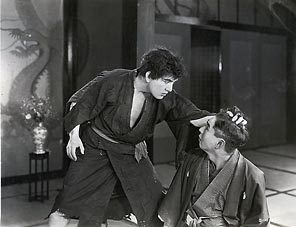Stephen Whitty does a nice profile of Japanese-American actor Sessue Hayakawa, an early pioneer in a new medium of silent films, and one of the most well known Hollywood movie stars in his day:
“Born in 1889 to a prominent Japanese family…He ended up settling in Los Angeles and doing local Japanese theater; discovered by movie producer Thomas Ince in 1914, he then moved on to pictures, playing not only Asian characters but Native Americans and Arabs. Then, the following year, he made “The Cheat.”… Hayakawa played a handsome businessman who lends a desperate white woman money, then brands her as his property… “The idea of the rape fantasy, forbidden fruit, all those taboos of race and sex — it made him a movie star. And his most rabid fan base was white women.””
The article goes on to describe how Hollywood, after Hayakawa, has taken huge steps backwards for Asian-Americans. A reference in the article is made him in a documentary called “The Slanted Screen,” which chronicles the history of Asians and Asian-Americans and the stereotypes they betrayed on the silver screen. I think that we can all agree that Asian-Americans are starting to make a lot more progress in American media in terms of more and better representation and less stereotyping, but as always, there is still a lot of room for improvement. I found a clip of “The Cheat” here on YouTube:





